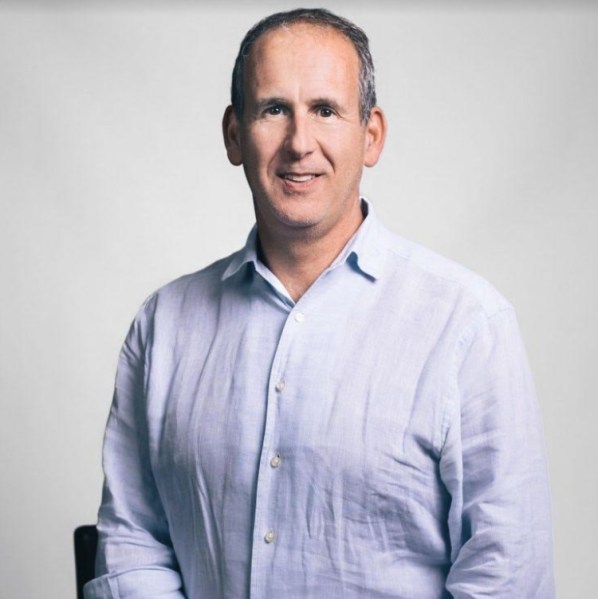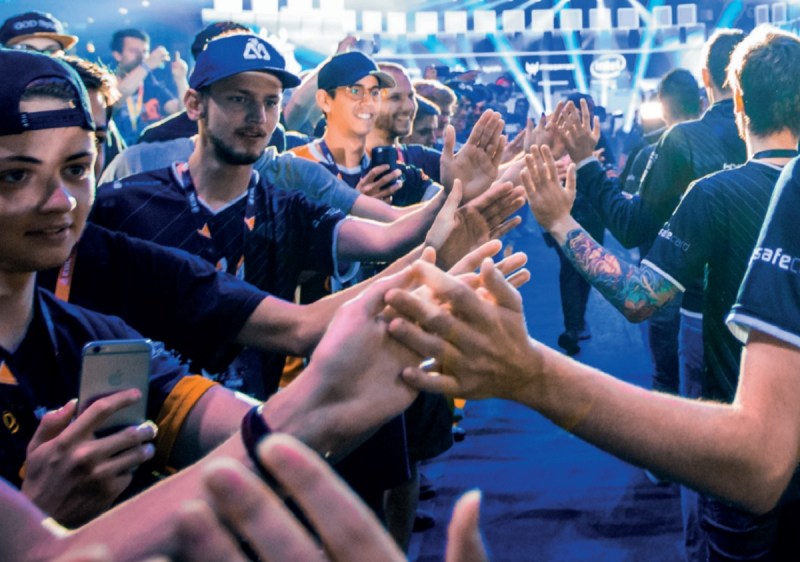Not many investors have the expertise to invest in the hit-or-miss video game business. But Jon Goldman has figured it out.
He is a venture partner at Greycroft, the early-stage venture capital firm in Los Angeles that has had big exits such as Maker Studios (bought by Disney), Buddy Media (bought by Salesforce.com), and Braintree (bought by PayPal). He has invested in numerous game companies through Greycroft, but he recently created a new way to invest on his own through the GC VR Gaming Tracker Fund.
Goldman manages the Tracker fund, which invests in seed stage companies across virtual reality, augmented reality, games, and esports. And he also serves as managing partner at Skybound, which handles licensing for The Walking Dead. Tracker is independent of Greycroft’s family of core funds but counts Greycroft as a limited partner and close business partner.
Goldman picked up his game expertise as founder and CEO of Foundation Entertainment, one of the biggest independent makers of video games. It has 1,000 employees and 11 studios when he sold it in 2006.
I interviewed Goldman about his investment outlook for 2018 in sectors such as enterprise VR, esports broadcasts, streaming, and monetization tools — all areas that he is excited about. Goldman has made more than 20 investments through tracker, and he has become one of the biggest backers of game-related startups. In the past year, his fund investments include Sliver TV, Mind Show, The Wave VR, FanAI,CameraIQ, MetaArcade, CameraIQ, and Toonstar.
Here’s an edited transcript of our interview.

Above: Jon Goldman is general partner of GC VR Gaming Tracker Fund and a Greycroft venture partner.
Jon Goldman: I’ve done 30 or so investments across a variety of things, in one way or another. They’re all game-related. I have a few VR deals that are health care-related. One around pain management and another around autism and mental health challenges. But by and large they’re game-related. I invested in Fable, and in Kite and Lightning, which is doing a VR-based arena battle game with a spectator mode for folks outside VR.
GamesBeat: What are some of your biggest bets on games?
Goldman: There are a couple of things that I’ve continued to support. One is a company down in Los Angeles called Mindshow, which is doing an interactive creativity tool in VR. It allows you to set up little interactive scenarios that are game-like, or just set pieces or bits of narrative, shows you can output to YouTube. What’s interesting is, instead of having to build something in 3D and program it, it’s very much a program by example system. You operate your 3D characters as puppets. Anybody with a controller can act out something. You can rewind, set the camera angles, re-compose your shot. They’re almost like broadcast tools.
Another one I’ve really loved — you’ve seen TheWave VR, the music system? People are skeptical at first, but I’ve never seen anybody not be blown away by it. I showed it to the head of Sky Films in the U.K., a guy who must be in his 60s. The CEO used to work with Harmonix. He’s built the most interesting music play system I’ve seen. You’re basically DJing, but that doesn’t really capture it. It’s not a facsimile of a DJ deck or anything. You’re playing with light and space and shapes to affect the music, You actually see people dancing in a way that wouldn’t have believed unless I saw it.
GamesBeat: What do you think as far as broader trends that are going on? VR seems to be giving way to esports as the hot sector at the moment.
Goldman: Right. I just recently — we’re doing an announcement around this, but I don’t know if it’s ready to publish. It’s a company doing esports-related stuff in blockchain. Two trendy things at once. I feel the same way. I made a number of bets in VR. The market didn’t blow up immediately. I have a few companies like the ones I just mentioned that I’m long-term bullish on, but I’m not feeling an intense need to keep adding to the portfolio there.

Above: Jon Goldman’s GC VR Gaming Tracker Fund invested in Epics.gg
GamesBeat: I’m noticing one or two stories related to new esports investments each week now. It seems like we’re seeing a groundswell.
Goldman: There’s one sort of backing trend. Let’s separate that purely from the intrinsic value of esports. There are a number of wealthy LPs and wealthy individuals in general who may not be able to buy a sports franchise, but this looks like a way to get into team ownership. I think you’re seeing a lot of very wealthy people, including existing team owners—the price to get involved is not a big price for them. They’re laying some bets there.
The overall trends are just very intriguing. The level of spectators and engagement would get anybody’s attention. A lot of traditional athletic sports are aging up. That creates an issue. And then because you’re seeing this youth viewership, it gets brands interested. You have a lot of parts to the ecosystem of traditional sports that are attractive to high net worth individuals, venture firms like mine, and then also to brands. If you look at how it’s done in traditional sports, there are lots of ways to make money: ticketing, sponsorship, endorsements. The whole business ecosystem could apply here.
Just like VR, if you’re an investor, you want to get involved as early as you can and see how it plays out. That’s one thing a lot of people don’t realize about this herd behavior that happens in investing.
GamesBeat: You don’t want to be last.
Goldman: Right. That’s the nature of venture capital. These are illiquid, riskier things with potentially high rewards. That’s where you want to play. But I’ve always felt—I think for people like us who’ve been around it a long time, this is just an extension of what we’ve seen in terms of social gameplay. Most games used to be single-player. Then you add social gameplay and it makes it stickier and harder for people to leave, even for what might ostensibly be a superior game.
Now, over the past few years, thanks to Twitch, we’re seeing this development where the non-player audience can be even bigger than the player audience. That turns gaming into a media business, as opposed to just a games business. If you look at things like HQ Trivia, that’s just part of a trend in spectators and participants building up a big audience. That gets the attention of brands and changes the nature of gaming.
If you look at things like Outpost Games — I’m not an investor there, but it’s very interesting, this idea of a game like a game show where, if you die, you’re out. Just like losing on Jeopardy. I’m not coming back. The game isn’t about me. The game is for the spectators.

Above: Jon Goldman invested in Fable Esports.
GamesBeat: I keep wondering how big this opportunity is going to be, people getting paid to play games, where it’s all about drawing attention to yourself. Esports athletes are one form of that, but we see all these other kinds of content creators. It seems like a pretty big pool of people is starting to make money from being watched around games.
Goldman: That’s what you need. I’m sure you get the same thing. People ask me all the time, incredulously, “People watch other people play games?” My older relatives who watch golf on TV–that’s inexplicable to a lot of people, but in another way it makes total sense. If you play golf you want to watch really good players play golf. If you play League of Legends or DOTA, you want to watch really good players play.
Extending the analogy, say you’re a casual tennis player. Then you go and get lessons, because there are 20 courts at the club and people can see you, so you don’t want to embarrass yourself. Now people are playing games in public, and they want to be pretty good, or at least catch up. It’s not like everyone expects to be a professional, but some people want to take a chance at it. Either way, when you’re playing socially, you don’t want to embarrass yourself.
I’ve invested in a company out of Boston, Gamer Sensei. They’re doing lessons. I think that if you join a game like League of Legends, you want to get up the curve relatively quickly. In the same way that people go to the club pro to take golf lessons, tennis lessons, whatever it is, now that gaming is much more of a public, social experience, it creates an opportunity for teaching in a way that didn’t exist before. In that way it very much mirrors how traditional sport operates, from the amateur level up to pro.
GamesBeat: So you think the overall opportunity is in gaming as a media business?
Goldman: Right. The shift from games for gamers to games for an audience is the way I look at the trend, as opposed to just “esports is the trend.” Esports is just one component of a larger shift in the industry that’s taken place over my career. I got started doing packaged software, mostly single-player. This is a big sea change. Esports is part of a much bigger phenomenon.

Above: Wonder
GamesBeat: Can you talk about the way the fund works, tracking your own investments? I’ve seen some of it happening before, like Peter Levin investing in Immortals and bringing in Lionsgate as an investor later. In your case, you’ve invested with your own fund, but Greycroft can come into some of these investments later?
Goldman: Right. Let me lay out the relationship. I’m a venture partner in Greycroft, the core fund. That’s the fund that does A and B rounds. I’m responsible for sitting on boards or shepherding companies. The two that I’ve championed are Fig, Justin Bailey’s company, which you know—that didn’t come through my tracker fund. That went directly to the core fund. And then a VR sports viewing company called LiveLike. Those were two investments that I championed. I sit on the boards. I’m on the board of some other companies as well, responsible for them.
Separately, there’s this tracker fund, in which Greycroft is a limited partner. They’re also my business partner. Greycroft runs the back office, which is incredibly time-consuming, more than people think. It’s a huge benefit for me in terms of meetings with companies and activating deals. All the other partners at Greycroft will help me look at and think through stuff. All the young analysts will help analyze a company. On the deal activation side I can just say, “Yep, I want to put a couple hundred thousand in this company,” and it all gets taken care of through the finance team. Every deal I do gets tracked in a database. I can look at stuff from a couple of years ago.
It’s an incredible partnership. I’m very appreciative of that partnership, because it takes all the legwork and pain out of investing. I can just focus on the companies and know that everything will be done properly. And then I’ve got the Skybound stuff, of course. I just came back from the Walking Dead cruise.
GamesBeat: As far as other things that are interesting, stuff to look forward to in 2018, what do you see?
Goldman: I’m going to be spending a lot more time in 2018 on esports and AR. I’ve invested in a young company here in Los Angeles called Camera IQ, which is kind of an authoring system for AR, easy annotation of the world. They’re best known for being the AR partner for the Coachella music festival last year. Two very charismatic young women. I’m seeing more AR game-related pitches, but I haven’t found something I want to pull the trigger on.
I invested a little bit in FanAI. I’d encourage you to follow that. It’s attacking this issue of how brands can get involved in esports and feel confident about it, versus everyone thinking it’s just an endemic audience. I think that’s a really important thing to solve in video gaming becoming a mainstream media opportunity. If you’re at a big ad agency, you’re not really thinking about esports a lot. Maybe you’ve heard of it, but you just assume that it’s only good for Red Bull or Mountain Dew.
What FanAI is doing is using purchase data, attendance data, and social data around esports attendees to show that no, they buy Toyota cars, they buy all kinds of things. That helps frame a media opportunity for more than just endemics.
GamesBeat: What do you think of the competition among investors for gaming deals? Does it seem like there’s a lot of savvy game investors out there?
Goldman: There are a lot more. I interact with Quentin. I’m seeing Peter Levin tomorrow. The London Venture guys, Index, there are a number of people who are now taking this industry very seriously. In general, because it’s such a risky business at this stage—I focus mostly at the seed stage, which is the riskiest stage. Most people are comfortable syndicating deals. We certainly are. That means there’s not a tooth and nail kind of deal competition. It’s more, you want to get other people involved and have more oars in the water, so you can help a company. Everyone has their connections. That can really make a difference at the seed stage.

Above: Sliver.tv
GamesBeat: As far as where the exits are these days, what are the expectations entrepreneurs should have?
Goldman: Here’s the trickiest thing. When you invest at seed stage, you’re often investing with first-time entrepreneurs who are really young. I saw this with a lot of my early VR investments. When you enter a market during a frothy period, you assume the hype is going to last forever.
The main advice I have is, you just have to focus on fundamentals. You can’t hype your way to an A and B round. That only works, maybe, for a seed round. Ultimately you need fundamentals. You need users and engagement and eventually monetization. You have to focus on delivering a real business, as opposed to recycling your seed pitch, which a lot of entrepreneurs do. You’ll see, for an A or B round, that the bulk of their bet is still on how big the market is, how VR or AR or what have you has the ability to change the world.
The later the stage you get, the more you’re judged on just your metrics. You have to move beyond specialist gaming funds to access more capital. You need to speak their language. You may be compared not to other gaming companies, but to an e-commerce company or an ad tech company. If you’re not interesting based on your business fundamentals, you limit yourself only to investors who want to support games. The larger the capital you need, the less likely you are to find people who’ll do that.
That’s a real challenge for entrepreneurs in creative industries: understanding the difference between a seed pitch and an A pitch and a B pitch. At each stage you need to be de-risking some part of your business. In your seed stage you should figure out product-market fit, or be very close to figuring that out. You should have some hypotheses around user growth and engagement. “People like what I’m doing. Now I need some money to get more of those people and make sure they’re engaging.” You can maybe do that twice, during A and B, where you’re running that next step of growing and engaging users. After that, you need a hypothesis around how to make money.
Checking those things off, as opposed to just, “This looks really cool” — that’s the difference between going to financial investors as opposed to endemics. One of my companies just raised some money from Wargaming. In that sense, you have a different sort of investor audience. They’re also a publisher. They’re comfortable making decisions based on creative output. Financial investors, by and large, that’s not their game plan. You need to know who the right capital provider is for whatever progress you’ve made.
GamesBeat: How involved do you have to be? You mentioned that you can tap younger people to help understand some of this culturally.
Goldman: It’s more just analyzing the deal. It’s about spreadsheets. Not so much that I need a youth interpreter. [laughs] I’ve been in the games industry for a while, and I have kids aged 23 and 18. As an investor I’m looking for different sorts of things. At seed stage I’ve found the cliché about CEO making all the difference is really important. An experienced CEO, someone who’s been part of a startup or made a successful game, someone who understands how you go from concept to making money, that’s critical. At this stage it’s the most critical decision.
I sometimes think I’m backing a trend or a game idea, but really, you’re backing a person, some man or woman who has a vision and thinks they’ll be able to make things happen in the market. If they’re making a game, are they well known? Do they have connections, like Justin does, that make a difference? Have they led a team before? Are they bringing people from a previous project they were involved in? That tells me their colleagues don’t think they’re an asshole. Those are important things that don’t have to do with the particular opportunity, but they can really determine the success of a business.

Above: Esports teams are getting more brand sponsorships.
GamesBeat: As far as the interest of much bigger companies in gaming — Tencent, Softbank, they’re very interested in gaming. The likes of Google, Amazon, and Facebook are doing a lot of maneuvering. Where do you think gaming fits in the larger entertainment or technology universe?
Goldman: Financially it’s probably the most important form of media. If you’re a media company and you’re not taking gaming seriously, you’re being shortsighted. Historically, there’s just been a coterie of media executives who’ve looked at video games as options for merchandising. In their heart of hearts they really just want to make movies or TV. That’s a mindset that, in terms of hours of engagement, the opportunities around social, around cooperative and competitive play — it’s the most important form of media. You can’t ignore it.
That’s why those companies are paying attention. Softbank’s investment in Improbable is a pretty amazing signal of how important gaming is. I’m excited by the potential of that technology to allow multi-genre gaming. You really could have a game where people can drive and shoot and explore, where you combine all different types of gameplay. That would enable an even more social experience, where people could be involved in the game together, but play the genres they like, play the role that fits their interest.
GamesBeat: It sounds like you’re having fun.
Goldman: It’s super fun. I’m taking it a bit easy in my 40s. I’ve had a bunch of projects going on, but as I saw my nest emptying, I basically loaded up. I have three pretty consuming things. It’s been great. I now have a whole new network of 20- and 30-year-old entrepreneurs, and it’s pretty energizing compared to what you typically do, where you run through your career with your same cohort. It’s been fun.

